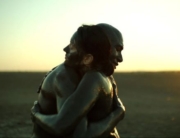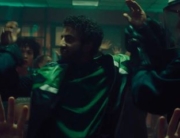
Linda Cardellini and Maichael Shannon in RETURN (DADA Films)
This may be the year of the relapse movie. In the case of Return, the drug is the armed forces. An impressive Linda Cardellini stars as Kelli, a U.S. soldier returning from deployment to her small town and awaiting husband and two girls. It doesn’t take long for the pressures of life to rival those of battle, and when she receives orders for her second tour, Kelli frantically rethinks all the constants she thought were a part of her life. This mostly unremarkable film, which somehow premiered at the Director’s Fortnight at Cannes, has, at least, an important story to tell.
Michael Shannon is Mike, her conscientious plumber/husband who, in her absence, has done well taking care of the household and kids, but he has also been seeing another woman. Kelli largely takes this news like the soldier she is, pressing on in the face of the challenge, yet her time away from the family and her recurring episodes with alcohol have put her in legal limbo concerning her family. Soon, with the lack of Mike’s support and with only limited custody of the kids, things start to fall apart for her. The drinking gets more out of hand. She fraternizes with seedy strangers, and suddenly, another deployment starts to look like a pretty good option.
But I’m reading a lot into this. What the film doesn’t do well is give you a stake in the outcome. I found myself sometimes rooting against Kelli, if for nothing else than in hopes of actually feeling something from watching the film. I never quite understood what Kelli had lost when her family drifted away from her because we never knew her family prior to her deployment and what dynamic existed beforehand.
However, what the film does well is take its events in stride, like Kelli. What could be a harshly melodramatic sob story is instead much more character driven. Cardellini does a great job, giving us several subtle emotions at any given moment, and I really found myself fascinated by several supporting characters, namely Kelli’s new Alcoholics Anonymous friend, Bud (John Slattery), and her longtime girlfriend Shannon (Louisa Krause). In both cases, I found them to be far better used than the usually fascinating Michael Shannon, in a poorly written role. (I didn’t know it was possible to make Michael Shannon forgettable, yet thinking back on his work here, it’s the only word that comes to mind.) Both Bud and Shannon, minor but essential characters, are depressingly small townish to the gills, exhausting any idea one might offer on how Kelli can kick this funk. With friends like these…
But Kelli’s not a total victim, or so freshman writer-director Liza Johnson implies. Sure, the army’s gonna chew you up and spit you out without a support net, as it does tens of thousands of vets each year, but Kelli wrestles with actual personal responsibility here. You don’t give up when you lose custody of your kids, you don’t give up when you seek help for alcoholism, and you don’t give up when you are ordered back to Afghanistan. This is definitely a movie about what it’s like when the going gets tough. Let’s just hope Kelli, and those tens of thousands like her, are, well, tough.






Leave A Comment